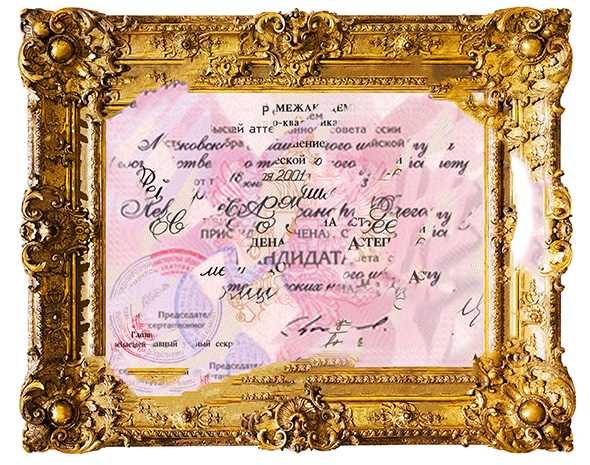It’s not for oil or guns. It’s for plagiarized dissertations. And every self-respecting doctor, lawyer, and politician in the country wants one.

Late last year, Russian newspapers reported what would have qualified as a stunning piece of news almost anywhere else: The chairman of the country’s largest parliamentary body had been exposed as a plagiarist. Sergei Naryshkin, the former chief of staff in Vladimir Putin’s administration and a prominent member of his United Russia party, stood accused of receiving the Russian equivalent of a doctoral degree on the strength of a dissertation in which more than half of the pages contained material lifted from other sources.
In a satisfying twist, one of the uncredited guests in Naryshkin’s thesis—a 196-page paper titled “Foreign Investment in Russia as a Factor in Economic Development”—was an unabashedly liberal economist named Vladislav Inozemtsev. “It’s quite amusing that a prominent member of United Russia decided to turn to my article,” Inozemtsev said at the time. “It seems he found it to be of good quality.”
Of course, no one really believed that Naryshkin had read Inozemtsev’s article or that he was guilty of copying it himself. Rather, he was suspected of paying a ghostwriter to produce a thesis in his name, then bribing academic officials to secure its certification. Naryshkin probably never even read the dissertation that had earned him his degree.
In the United States, the exposure of a government official of Naryshkin’s stature as a plagiarist would likely set off a major scandal. (Imagine if Paul Ryan was found to have written an economics paper in which he had borrowed liberally from Paul Krugman.) Naryshkin’s fate hasn’t been so dire. After giving a half-hearted statement in his own defense—“I was told that some website published some information. But I trust the judgment of real scientists”—he continued doing his job as though nothing out of the ordinary had happened.
To be fair, nothing much had. As Naryshkin himself surely knew when the accusations against him were leveled, he is just one of more than 1,000 high-achieving, well-heeled Russians who have recently been caught plagiarizing large parts of their dissertations.
Many of the alleged fraudsters are politicians. Some are judges. Others are prosecutors, police officials, and heads of universities; one was a bureaucrat in charge of overseeing Russia’s circus industry. In the past few years alone, there have been credible allegations of dissertation plagiarism made against Russia’s minister of culture, the governor of St. Petersburg, and the head of the country’s top federal investigating authority. Just in the past month, copy-and-pasting has been discovered in the dissertations of the deputy finance minister of the Russian republic of Mordovia and a government adviser on justice who is the putative author of a thesis comparing legal principles in Russia and the West.n all these cases, the alleged fraud was exposed by members of a volunteer organization that calls itself “Dissernet”—the “website” Naryshkin referred to so dismissively. Started in early 2013 by a handful of scientists and journalists, the group has undertaken the task of identifying and publicly shaming government functionaries, academic administrators, and members of Russia’s so-called elite who allegedly hold advanced degrees they did not earn through legitimate means. Using software that looks for sections of text that resemble previously published work, Dissernet has, to date, identified roughly 5,600 suspected plagiarists and published damning reports on about 1,300 of them. In an exposé posted earlier this year, Dissernet showed that 1 in 9 members of the Russian State Duma—the parliamentary body that Naryshkin presides over—had received their diplomas using dissertations that contained large portions of other people’s work and that had, most likely, been purchased from ghostwriters....MORE